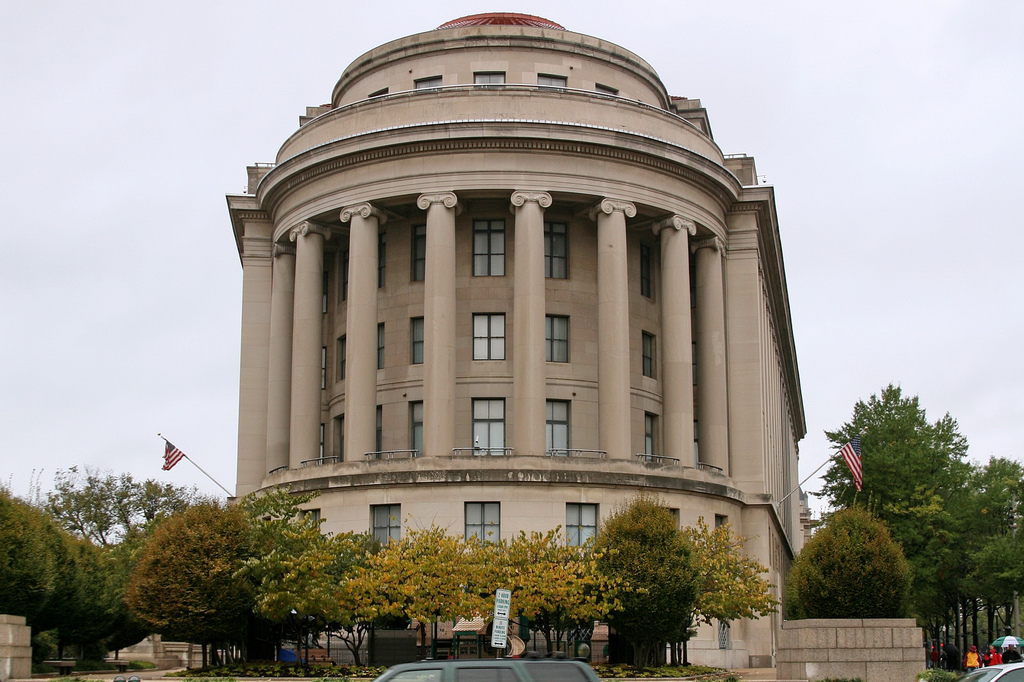SinoTech: Huawei Appeals to U.S. Agencies for Market Access
Chinese telecommunication company Huawei has filed a 39-page comment with the Federal Trade Commission (FTC) alleging that the U.S. government has unfairly denied Huawei and other Chinese telecom companies equal access to American markets.

Published by The Lawfare Institute
in Cooperation With

Chinese telecommunication company Huawei has filed a 39-page comment with the Federal Trade Commission (FTC) alleging that the U.S. government has unfairly denied Huawei and other Chinese telecom companies equal access to American markets. Huawei submitted the comment for the FTC’s scheduled hearings on “Competition and Consumer Protection in the 21st Century,” which are due to begin this month. The letter accuses American regulators of restricting Huawei’s ability to sell its products within the U.S. for protectionist economic reasons, ostensibly justifying those restrictions on national security grounds; it encourages the FTC to counsel other government agencies against additional regulation. Huawei cited several examples of American “anti-competitive” measures, including the most recent National Defense Authorization Act, signed by President Trump last month, which prohibits federal agencies from purchasing equipment from Huawei and fellow Chinese telecom giant ZTE, as well as the FCC's proposal to ban U.S. carriers from using federal money to buy from Huawei or ZTE. Huawei filed a separate version of the letter to the FCC proposal, supplementing it with expert testimony. The proposal is currently receiving public comment.
Huawei’s international struggles are not limited to the United States; last week, the Australian government, citing national security concerns, announced that it would block Huawei and ZTE from providing equipment for that country’s 5G network. The decision earned a strong response from the Chinese government, which warned that the ban was the “wrong decision” and could sour Australia and China’s commercial relationship. Huawei independently denied any basis for Australia’s national security concern, reasserting its autonomy from the Chinese government and contending that Australia’s decision was “politically motivated.” Other U.S. allies may soon join Australia; the Japanese government has launched a study into whether use of Chinese telecom equipment ought to be restricted, and a U.K. government report published in July found “only limited assurance” that Huawei’s equipment did not pose risks to national security. The 2019 U.S. National Defense Authorization Act, signed by President Trump last month, prohibits federal agencies from purchasing equipment from Huawei and ZTE.
ZTE will have some cause for celebration, as its shares have rebounded since it struck a deal with the Commerce Department to avoid potentially crippling sanctions in July. Those gains came despite a $1.1 billion loss in the first half of 2018, when ZTE was forced to shut down operations after the Commerce Department instituted a denial order against the company. Those operations have now fully resumed, and ZTE is projecting a profit during the upcoming quarter. Its operations will closely observed by Roscoe Howard, a former federal prosecutor who Commerce Secretary Wilbur Ross appointed in late August to ensure ZTE’s compliance with the terms of the sanction reprieve.
U.S. and Chinese negotiators make little progress as tariffs near
The most recent round of trade negotiations between the Trump administration and Chinese officials ended on Aug. 23 without substantial progress. Those negotiations were the first trade talks between the two governments since early June and involved mid-level officials from the U.S. Department of Commerce and China’s Ministry of Commerce. The respective rankings of the officials involved suggested that a breakthrough was unlikely, and Commerce Secretary Wilbur Ross framed the negotiations as “exploratory sessions” that might lay a foundation for more substantial talks down the road. But the two sides were reportedly unable to reach any shared ground on the topics that have divided them since the conflict began: American negotiators complained of the trade deficit, IP violations, and limited market access, while Chinese officials emphasized their compliance with WTO treaties.
The talks began as the Commerce Department instituted new tariffs against $16 billion in Chinese imports; the Commerce Ministry immediately responded in kind. Those tariffs marked the second and final installment in the first $50 billion wave of tech-related tariffs. The U.S. and China both instituted the initial $34 billion of that wave in early July. The Trump administration is expected to impose the next wave, targeting $200 billion of Chinese exports, as soon as this Thursday, when the administrative public comment period will end. Chinese officials have promised to take “countermeasures,” although it is not immediately clear what form those measures will take, as U.S. exports in goods to China last year totaled less than $130 billion.
More senior officials, include Treasury Secretary Steve Mnuchin and Chinese economic czar Liu He, reportedly engaged in unofficial discussions over the phone last week. But those talks were similarly unproductive, and the two governments have not scheduled any future meetings. At the official meetings on Aug. 22 and 23, Chinese officials reportedly suggested discontinuing further negotiations until after the U.S. midterm elections in November. That would mark a substantial departure from a report published earlier in August indicating that Chinese and American officials hoped to have a deal wrapped up by the time Presidents Trump and Xi meet at the G20 Summit in November.
In other news
- William Evanina, director of the U.S. National Counterintelligence and Security Center, has accused the Chinese government of using LinkedIn to recruit Americans with access to governmental and commercial secrets. Evanina stated that Chinese agents had sent mass messages through fake accounts, and urged Linkedin to shut down any fake accounts that it was able to identify. LinkedIn responded that it had been working with U.S. law enforcement to solve the problem and that the website had policies to “actively” remove any fake accounts, including 40 removed earlier in August. The German counterintelligence service identified a similar campaign targeting government employees in December. China’s Foreign Ministry has denied the allegation.
- Fourteen human-rights organizations submitted an open letter last week calling on Google to reconsider its plan to launch a censored search engine in China. A censored search engine, the groups alleged, would violate freedom of expression and assist in the silencing of political dissidents; Google would be “actively participating in those violations for millions of internet users in China.” Google’s plans to re-enter the Chinese market, codenamed Dragonfly, were leaked by an employee to the Intercept last month. Several hundred Google employees have signed an internal letter opposing the program. President Trump aired his own grievances against Google last week, writing in a tweet that the company’s search engine was "RIGGED" against conservative news outlets. An administration official stated last week that the White House would consider regulations on the search engine’s output.
- Chinese tech giants Baidu, Alibaba and Tencent removed cryptocurrency forums and pledged to clamp down on cryptocurrency use over their platforms last week amid growing pressure from Chinese regulators. Five of China’s leading financial regulators had issued a statement warning against cryptocurrency offers on the previous Friday, and regulators also pledged to block Chinese internet users from accessing more than 120 offshore cryptocurrency exchanges. More localized bans have taken effect in Guangzhou and Chaoyang, where hotels and other venues are now prohibited from hosting events promoting cryptocurrencies.
- Chinese regulators have initiated a program to protect children’s eyesight by discouraging children from using electronics for more than an hour each day. The Ministry of Education, one of eight agencies involved, quickly published a notice instructing gaming regulators to restrict children’s access to online games. Chinese game makers and distributors have been stuck in a position of uncertainty since March, when approvals for new games ceased after the Chinese government’s shake-up of regulatory authority; approvals now appear to lie in the domain of the Communist Party’s State Administration of Press and Publications.
Commentary & Analysis
Elsewhere on Lawfare, several articles address the Trump administration’s reported decision to loosen the interagency consultation process for offensive U.S. cyber operations against foreign adversaries. Dakota Rudesill acknowledges that the shift may improve American responsiveness, but he warns that shifting responsibility downward may reduce executive accountability for U.S. operations. Christopher Porter acknowledges the Trump administration’s shift as a good first step but advocates for more proactive government measures to deter foreign cyberattacks against American civilians and civilian networks.
In other news, Jonathan Masters and James McBride have updated their backgrounder on Western governments’ attempts to limit Chinese investment in sensitive industries. At New America, Hollie Russon-Gilman and Daniel Benaim warn that “China's Aggressive Surveillance Technology Will Spread Beyond Its Borders.” In the Diplomat, Grant Wyeth talks to Bates Gill on the Australian government’s decision to ban Huawei and ZTE equipment from its 5G infrastructure. At the Center for Strategic and International Studies, Stephanie Segal, Ann Listerud and Jack Caporal examine the state of the trade conflict after the breakdown of U.S.-China negotiations. At the Peterson Institute for International Economics, Robert Lawrence explains “How the United States Should Confront China Without Threatening the Global Trading System.”
In the Wall Street Journal, Lingling Wei and Bob Davis summarize recent indicators that the Chinese economy may be slowing down. In Bloomberg, Daniel Moss suggests that China’s shift towards a neutral trade balance may make resolution of the trade conflict more difficult. In the South China Morning Post, Alex He argues that the trade conflict reflects fundamental incompatibilities between the Chinese and American economic models. In the Washington Post, Josh Rogin compares President Trump’s suggestion of regulating Google’s search results to the Chinese Communist Party’s demands for censorship.






